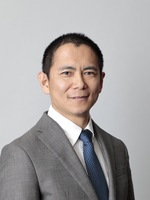Discrete Signal Detection via Compressed Sensing Technique
Invited Speaker

Prof. Kazunori Hayashi
Kyoto University, Japan
Abstract
The unknown vector reconstruction from its linear measurements is one of typical problems in wireless communications systems, such as channel equalization, channel estimation, MIMO (multi-input multi-output) signal detection, and IoT (internet-of-things) signal detection. In conventional approaches, the number of observations in linear measurements is generally assumed to be greater than or equal to that of unknown vector elements. For example, in MIMO signal detection problem, the number of receiving antennas should be greater than or equal to that of transmit streams. However, in order to improve the spectral efficiency, it is preferable to cope with the scenario where the number of linear measurements is possibly less than that of dimension of the unknown vector, namely, underdetermined linear measurements. In this talk, we call such signal processing as overloaded signal detection, and explain fundamental ideas to recover an unknown discrete and/or sparse vector from underdetermined linear measurements by using compressed sensing technique.
Biography
Kazunori Hayashi is currently a Professor at the Center for Innovative Research and Education in Data Science / Graduate School of Informatics, Kyoto University. He received the B.E., M.E., and Ph.D. degrees in communication engineering from Osaka University, Osaka, Japan, in 1997, 1999, and 2002, respectively. He was an Assistant Professor from 2002 to 2007, an Associate Professor from 2007 to 2017 at the Graduate School of Informatics, Kyoto University, and a Professor from 2017 to 2020 at the Graduate School of Engineering, Osaka City University. His research interests include statistical signal processing for communications systems. He received the ICF Research Award from the KDDI Foundation in 2008, the IEEE Globecom Best Paper Award in 2009, the IEICE Communications Society Best Paper Award in 2010, the WPMC’11 Best Paper Award, the Telecommunications Advancement Foundation Award in 2012, the IEICE Communications Society Best Tutorial Paper Award in 2013, and APSIPA ASC Best Special Session Paper Nomination Award in 2019. He is a member of IEEE, APSIPA, IEICE, and ISCIE.